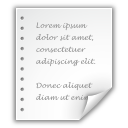Carmina / compiled by Stephen V.F. Waite
| dc.contributor | Waite, Stephen Packard Humanities Institute |
| dc.contributor.author | Catullus, Gaius Valerius |
| dc.date.accessioned | 2018-07-27 |
| dc.date.accessioned | 2019-07-04T11:01:55Z |
| dc.date.available | 2019-07-04T11:01:55Z |
| dc.date.created | 70 BCE-54 BCE |
| dc.date.issued | 1976-01-01 |
| dc.identifier | ota:0324 |
| dc.identifier.citation | http://purl.ox.ac.uk/ota/0324 |
| dc.identifier.uri | http://hdl.handle.net/20.500.12024/0324 |
| dc.description.abstract | In Latin Title from University of Oxford Text Archive records Forms part of Project LIBRI (Literary Information Bases for Research and Instruction), a collection of literary texts collected by Stephen V.F. Waite, begun as the American Philological Association Respository of Classical Texts in Machine-Readable Form Scriptorum classicorum bibliotheca Oxoniensis |
| dc.format.extent | Text data less than 512 KB Contains markup characters |
| dc.format.medium | Digital bitstream |
| dc.language | Latin |
| dc.language.iso | lat |
| dc.publisher | University of Oxford |
| dc.relation.ispartof | Legacy Collection Digital Museum |
| dc.rights | Distributed by the University of Oxford under a Creative Commons Attribution-NonCommercial-ShareAlike 3.0 Unported License. |
| dc.rights.uri | http://creativecommons.org/licenses/by-nc-sa/3.0/ |
| dc.rights.label | PUB |
| dc.subject.lcsh | Addresses -- Italy -- 1st century B.C. |
| dc.subject.lcsh | Poems -- Italy -- 1st century B.C. |
| dc.subject.other | Poems |
| dc.title | Carmina / compiled by Stephen V.F. Waite |
| dc.type | Text |
| has.files | yes |
| branding | Oxford Text Archive |
| files.size | 297333 |
| files.count | 5 |
| otaterms.date.range | BCE |
This item is
Attribution-NonCommercial-ShareAlike 3.0 Unported (CC BY-NC-SA 3.0)
Publicly Available
and licensed under:Attribution-NonCommercial-ShareAlike 3.0 Unported (CC BY-NC-SA 3.0)
Files for this item
Download all local files for this item (290.36 KB)

- Name
- cat-0324.txt
- Size
- 92.5 KB
- Format
- Text file
- Description
- Version of the work in plain text format
% tex2asc-version: 1.0
%
% Catulli Carmina.
%
% Contributor: Andrew Gollan <adjg@sour.sw.oz.au>
%
% Original publication data:
% <never published>
%
% Version: 0.01 (Beta), 11 December 1993
%
% This file is in the Public Domain.
%
\input ks_macros.tex
\beginsection I. ad Cornelium
{\poetrysize\obeylines\linesbyfive
cui dono lepidum nouum libellum
arida modo pumice expolitum.
Corneli tibi namque tu solebas
meas esse aliquid putare nugas
iam tum cum ausus es unus Italorum
omne aeuum tribus explicare cartis
doctis Iuppiter et laboriosis.
quare habe tibi quidquid hoc libelli
qualecumque quidem est. patroni et ergo
plus uno maneat perenne saeclo.
}
\beginsection II. fletus passeris Lesbie
{\poetrysize\obeylines\linesbyfive
passer. deliciae meae puellae.
quicum ludere. quem in sinu tenere.
cui primum digitum dare appetenti.
et acres solet incitare morsus.
cum desiderio meo nitenti
carum nescio quid libet iocare
et solaciolum sui doloris
credo ut tum grauis acquiesc . . .

- Name
- catullus-0324.txt
- Size
- 86.34 KB
- Format
- Text file
- Description
- Version of the work in plain text format
<A CATULLUS>
<S 1>
<L 1>
CUI DONO LEPIDUM NOVUM LIBELLUM
ARIDA MODO PUMICE EXPOLITUM?
$CORNELI, TIBI: NAMQUE TU SOLEBAS
MEAS ESSE ALIQUID PUTARE NUGAS
IAM TUM, CUM AUSUS ES UNUS $ITALORUM
OMNE AEVUM TRIBUS EXPLICARE CARTIS
DOCTIS, $IUPPITER, ET LABORIOSIS.
QUARE HABE TIBI QUIDQUID HOC LIBELLI
QUALECUMQUE; QUOD, [O] PATRONA VIRGO,
PLUS UNO MANEAT PERENNE SAECLO.
<S 2>
<L 1>
PASSER, DELICIAE MEAE PUELLAE,
QUICUM LUDERE, QUEM IN SINU TENERE,
CUI PRIMUM DIGITUM DARE APPETENTI
ET ACRIS SOLET INCITARE MORSUS,
CUM DESIDERIO MEO NITENTI
CARUM NESCIO QUID LUBET IOCARI,
ET SOLACIOLUM SUI DOLORIS,
CREDO, UT TUM GRAVIS ACQUISCET ARDOR:
TECUM LUDERE SICUT IPSA POSSEM
ET TRISTIS ANIMI LEVARE CURAS.
<S 2B>
<L 1>
TAM GRATUM EST MIHI QUAM FERUNT PUELLAE
PERNICI AUREOLUM FUISSE MALUM,
QUOD ZONAM SOLUIT DIU LIGATAM.
<S 3>
<L 1>
LUGETE, O $VENERES $CUPIDINES-QUE,
ET QUANTUM EST HOMINUM VENUSTIORUM.
PASSER MORTUUS EST MEAE PUELLAE,
PASSER, DELICIAE MEAE PUELLAE,
QUEM PLUS ILLA OCULIS SUIS AMABAT.
NAM MELLI . . .








